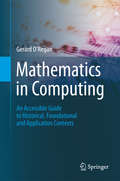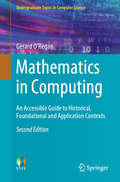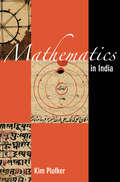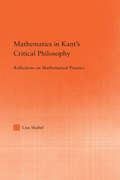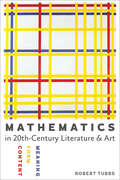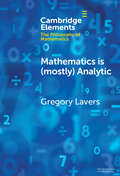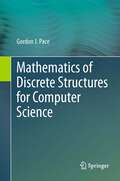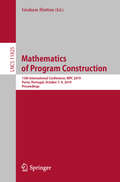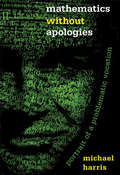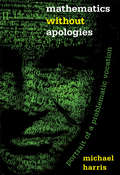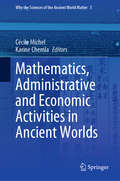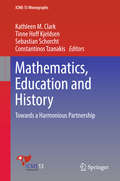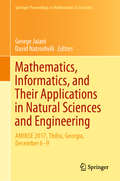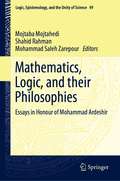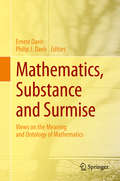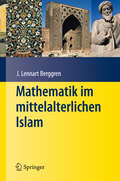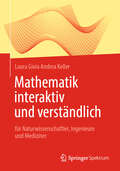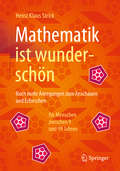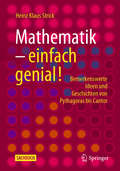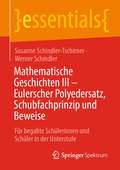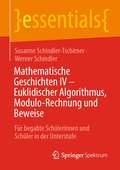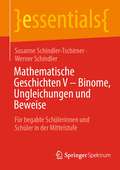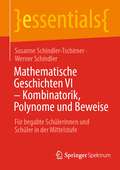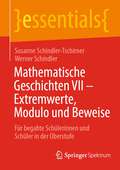- Table View
- List View
Mathematics in Computing
by Gerard O’reganThis clearly written and enlightening textbook provides a concise, introductory guide to the key mathematical concepts and techniques used by computer scientists. Topics and features: ideal for self-study, offering many pedagogical features such as chapter-opening key topics, chapter introductions and summaries, review questions, and a glossary; places our current state of knowledge within the context of the contributions made by early civilizations, such as the ancient Babylonians, Egyptians and Greeks; examines the building blocks of mathematics, including sets, relations and functions; presents an introduction to logic, formal methods and software engineering; explains the fundamentals of number theory, and its application in cryptography; describes the basics of coding theory, language theory, and graph theory; discusses the concept of computability and decideability; includes concise coverage of calculus, probability and statistics, matrices, complex numbers and quaternions.
Mathematics in Computing: An Accessible Guide to Historical, Foundational and Application Contexts (Undergraduate Topics in Computer Science)
by Gerard O’ReganThis illuminating textbook provides a concise review of the core concepts in mathematics essential to computer scientists. Emphasis is placed on the practical computing applications enabled by seemingly abstract mathematical ideas, presented within their historical context. The text spans a broad selection of key topics, ranging from the use of finite field theory to correct code and the role of number theory in cryptography, to the value of graph theory when modelling networks and the importance of formal methods for safety critical systems.This fully updated new edition has been expanded with a more comprehensive treatment of algorithms, logic, automata theory, model checking, software reliability and dependability, algebra, sequences and series, and mathematical induction.Topics and features: includes numerous pedagogical features, such as chapter-opening key topics, chapter introductions and summaries, review questions, and a glossary; describes the historical contributions of such prominent figures as Leibniz, Babbage, Boole, and von Neumann; introduces the fundamental mathematical concepts of sets, relations and functions, along with the basics of number theory, algebra, algorithms, and matrices; explores arithmetic and geometric sequences and series, mathematical induction and recursion, graph theory, computability and decidability, and automata theory; reviews the core issues of coding theory, language theory, software engineering, and software reliability, as well as formal methods and model checking; covers key topics on logic, from ancient Greek contributions to modern applications in AI, and discusses the nature of mathematical proof and theorem proving; presents a short introduction to probability and statistics, complex numbers and quaternions, and calculus.This engaging and easy-to-understand book will appeal to students of computer science wishing for an overview of the mathematics used in computing, and to mathematicians curious about how their subject is applied in the field of computer science. The book will also capture the interest of the motivated general reader.
Mathematics in India
by Kim PlofkerBased on extensive research in Sanskrit sources, Mathematics in India chronicles the development of mathematical techniques and texts in South Asia from antiquity to the early modern period. Kim Plofker reexamines the few facts about Indian mathematics that have become common knowledge--such as the Indian origin of Arabic numerals--and she sets them in a larger textual and cultural framework. The book details aspects of the subject that have been largely passed over in the past, including the relationships between Indian mathematics and astronomy, and their cross-fertilizations with Islamic scientific traditions. Plofker shows that Indian mathematics appears not as a disconnected set of discoveries, but as a lively, diverse, yet strongly unified discipline, intimately linked to other Indian forms of learning. Far more than in other areas of the history of mathematics, the literature on Indian mathematics reveals huge discrepancies between what researchers generally agree on and what general readers pick up from popular ideas. This book explains with candor the chief controversies causing these discrepancies--both the flaws in many popular claims, and the uncertainties underlying many scholarly conclusions. Supplementing the main narrative are biographical resources for dozens of Indian mathematicians; a guide to key features of Sanskrit for the non-Indologist; and illustrations of manuscripts, inscriptions, and artifacts. Mathematics in India provides a rich and complex understanding of the Indian mathematical tradition. **Author's note: The concept of "computational positivism" in Indian mathematical science, mentioned on p. 120, is due to Prof. Roddam Narasimha and is explored in more detail in some of his works, including "The Indian half of Needham's question: some thoughts on axioms, models, algorithms, and computational positivism" (Interdisciplinary Science Reviews 28, 2003, 1-13).
Mathematics in Kant's Critical Philosophy: Reflections on Mathematical Practice
by Lisa ShabelFirst published in 2003. Routledge is an imprint of Taylor & Francis, an informa company.
Mathematics in Twentieth-Century Literature & Art: Content, Form, Meaning
by Robert TubbsThe author of What Is a Number? examines the relationship between mathematics and art and literature of the 20th century.During the twentieth century, many artists and writers turned to abstract mathematical ideas to help them realize their aesthetic ambitions. Man Ray, Marcel Duchamp, and, perhaps most famously, Piet Mondrian used principles of mathematics in their work. Was it coincidence, or were these artists following their instincts, which were ruled by mathematical underpinnings, such as optimal solutions for filling a space? If math exists within visual art, can it be found within literary pursuits? In short, just what is the relationship between mathematics and the creative arts?In this exploration of mathematical ideas in art and literature, Robert Tubbs argues that the links are much stronger than previously imagined and exceed both coincidence and commonality of purpose. Not only does he argue that mathematical ideas guided the aesthetic visions of many twentieth-century artists and writers, Tubbs further asserts that artists and writers used math in their creative processes even though they seemed to have no affinity for mathematical thinking.In the end, Tubbs makes the case that art can be better appreciated when the math that inspired it is better understood. An insightful tour of the great masters of the last century and an argument that challenges long-held paradigms, this book will appeal to mathematicians, humanists, and artists, as well as instructors teaching the connections among math, literature, and art.“Though the content of Tubbs’s book is challenging, it is also accessible and should interest many on both sides of the perceived divide between mathematics and the arts.” —Choice
Mathematics in Twentieth-Century Literature and Art: Content, Form, Meaning
by Robert TubbsChips away at the notion of an accidental relationship between math and art and literature.During the twentieth century, many artists and writers turned to abstract mathematical ideas to help them realize their aesthetic ambitions. Man Ray, Marcel Duchamp, and, perhaps most famously, Piet Mondrian used principles of mathematics in their work. Was it mere coincidence, or were these artists simply following their instincts, which in turn were ruled by mathematical underpinnings, such as optimal solutions for filling a space? If math exists within visual art, can it be found within literary pursuits? In short, just what is the relationship between mathematics and the creative arts?In this provocative, original exploration of mathematical ideas in art and literature, Robert Tubbs argues that the links are much stronger than previously imagined and exceed both coincidence and commonality of purpose. Not only does he argue that mathematical ideas guided the aesthetic visions of many twentieth-century artists and writers, Tubbs further asserts that artists and writers used math in their creative processes even though they seemed to have no affinity for mathematical thinking. In the end, Tubbs makes the case that art can be better appreciated when the math that inspired it is better understood. An insightful tour of the great masters of the last century and an argument that challenges long-held paradigms, Mathematics in Twentieth-Century Literature and Art will appeal to mathematicians, humanists, and artists, as well as instructors teaching the connections among math, literature, and art.
Mathematics is (Elements in the Philosophy of Mathematics)
by Gregory LaversThis Element outlines and defends an account of analyticity according to which mathematics is, for the most part, analytic. The author begins by looking at Quine's arguments against the concepts of analyticity. He shows how Quine's position on analyticity is related to his view on explication and shows how this suggests a way of defining analyticity that would meet Quine's own standards for explication. The author then looks at Boghossian and his distinction between epistemic and metaphysical accounts of analyticity. Here he argues that there is a straightforward way of eliminating the confusion Boghossian sees with what he calls metaphysical accounts. The author demonstrates that the epistemic dimension of his epistemic account is almost entirely superfluous. The author then discusses how analyticity is related to truth, necessity, and questions of ontology. Finally, he discusses the vagueness of analyticity and also the relation of analyticity to the axiomatic method in mathematics.
Mathematics of Discrete Structures for Computer Science
by Gordon J. PaceMathematics plays a key role in computer science, some researchers would consider computers as nothing but the physical embodiment of mathematical systems. And whether you are designing a digital circuit, a computer program or a new programming language, you need mathematics to be able to reason about the design -- its correctness, robustness and dependability. This book covers the foundational mathematics necessary for courses in computer science. The common approach to presenting mathematical concepts and operators is to define them in terms of properties they satisfy, and then based on these definitions develop ways of computing the result of applying the operators and prove them correct. This book is mainly written for computer science students, so here the author takes a different approach: he starts by defining ways of calculating the results of applying the operators and then proves that they satisfy various properties. After justifying his underlying approach the author offers detailed chapters covering propositional logic, predicate calculus, sets, relations, discrete structures, structured types, numbers, and reasoning about programs. The book contains chapter and section summaries, detailed proofs and many end-of-section exercises -- key to the learning process. The book is suitable for undergraduate and graduate students, and although the treatment focuses on areas with frequent applications in computer science, the book is also suitable for students of mathematics and engineering.
Mathematics of Program Construction: 13th International Conference, MPC 2019, Porto, Portugal, October 7–9, 2019, Proceedings (Lecture Notes in Computer Science #11825)
by Graham HuttonThis book constitutes the refereed proceedings of the 13th International Conference on Mathematics of Program Construction, MPC 2019, held in Porto, Portugal, in October 2019. The 15 revised full papers presented together with an invited paper were carefully reviewed and selected from 22 submissions. The papers deal with mathematical principles and techniques for constructing computer programs. They range from algorithmics to support for program construction in programming languages and systems. Some typical areas are type systems, program analysis and transformation, programming-language semantics, security, and program logics.
Mathematics without Apologies
by Michael HarrisWhat do pure mathematicians do, and why do they do it? Looking beyond the conventional answers--for the sake of truth, beauty, and practical applications--this book offers an eclectic panorama of the lives and values and hopes and fears of mathematicians in the twenty-first century, assembling material from a startlingly diverse assortment of scholarly, journalistic, and pop culture sources.Drawing on his personal experiences and obsessions as well as the thoughts and opinions of mathematicians from Archimedes and Omar Khayyám to such contemporary giants as Alexander Grothendieck and Robert Langlands, Michael Harris reveals the charisma and romance of mathematics as well as its darker side. In this portrait of mathematics as a community united around a set of common intellectual, ethical, and existential challenges, he touches on a wide variety of questions, such as: Are mathematicians to blame for the 2008 financial crisis? How can we talk about the ideas we were born too soon to understand? And how should you react if you are asked to explain number theory at a dinner party?Disarmingly candid, relentlessly intelligent, and richly entertaining, Mathematics without Apologies takes readers on an unapologetic guided tour of the mathematical life, from the philosophy and sociology of mathematics to its reflections in film and popular music, with detours through the mathematical and mystical traditions of Russia, India, medieval Islam, the Bronx, and beyond.
Mathematics without Apologies: Portrait of a Problematic Vocation
by Michael HarrisWhat do pure mathematicians do, and why do they do it? Looking beyond the conventional answers—for the sake of truth, beauty, and practical applications—this book offers an eclectic panorama of the lives and values and hopes and fears of mathematicians in the twenty-first century, assembling material from a startlingly diverse assortment of scholarly, journalistic, and pop culture sources.Drawing on his personal experiences and obsessions as well as the thoughts and opinions of mathematicians from Archimedes and Omar Khayyám to such contemporary giants as Alexander Grothendieck and Robert Langlands, Michael Harris reveals the charisma and romance of mathematics as well as its darker side. In this portrait of mathematics as a community united around a set of common intellectual, ethical, and existential challenges, he touches on a wide variety of questions, such as: Are mathematicians to blame for the 2008 financial crisis? How can we talk about the ideas we were born too soon to understand? And how should you react if you are asked to explain number theory at a dinner party?Disarmingly candid, relentlessly intelligent, and richly entertaining, Mathematics without Apologies takes readers on an unapologetic guided tour of the mathematical life, from the philosophy and sociology of mathematics to its reflections in film and popular music, with detours through the mathematical and mystical traditions of Russia, India, medieval Islam, the Bronx, and beyond.
Mathematics, Administrative and Economic Activities in Ancient Worlds (Why the Sciences of the Ancient World Matter #5)
by Karine Chemla Cécile MichelThis book focuses on the ancient Near East, early imperial China, South-East Asia, and medieval Europe, shedding light on mathematical knowledge and practices documented by sources relating to the administrative and economic activities of officials, merchants and other actors. It compares these to mathematical texts produced in related school contexts or reflecting the pursuit of mathematics for its own sake to reveal the diversity of mathematical practices in each of these geographical areas of the ancient world. Based on case studies from various periods and political, economic and social contexts, it explores how, in each part of the world discussed, it is possible to identify and describe the different cultures of quantification and computation as well as their points of contact. The thirteen chapters draw on a wide variety of texts from ancient Near East, China, South-East Asia and medieval Europe, which are analyzed by researchers from various fields, including mathematics, history, philology, archaeology and economics. The book will appeal to historians of science, economists and institutional historians of the ancient and medieval world, and also to Assyriologists, Indologists, Sinologists and experts on medieval Europe.
Mathematics, Education and History: Towards A Harmonious Partnership (ICME-13 Monographs)
by Kathleen M. Clark Tinne Hoff Kjeldsen Sebastian Schorcht Constantinos TzanakisThis book includes 18 peer-reviewed papers from nine countries, originally presented in a shorter form at TSG 25 The Role of History of Mathematics in Mathematics Education, as part of ICME-13 during. It also features an introductory chapter, by its co-editors, on the structure and main points of the book with an outline of recent developments in exploring the role of history and epistemology in mathematics education. It serves as a valuable contribution in this domain, by making reports on recent developments in this field available to the international educational community, with a special focus on relevant research results since 2000. The 18 chapters of the book are divided into five interrelated parts that underlie the central issues of research in this domain: 1. Theoretical and conceptual frameworks for integrating history and epistemology in mathematics in mathematics education; 2. Courses and didactical material: Design, implementation and evaluation; 3. Empirical investigations on implementing history and epistemology in mathematics education; 4. Original historical sources in teaching and learning of and about mathematics; 5. History and epistemology of mathematics: Interdisciplinary teaching and sociocultural aspects. This book covers all levels of education, from primary school to tertiary education, with a particular focus on teacher education. Additionally, each chapter refers to and/or is based on empirical research, in order to support, illuminate, clarify and evaluate key issues, main questions, and conjectured theses raised by the authors or in the literature on the basis of historical-epistemological or didactical-cognitive arguments.
Mathematics, Informatics, and Their Applications in Natural Sciences and Engineering: AMINSE 2017, Tbilisi, Georgia, December 6-9 (Springer Proceedings in Mathematics & Statistics #276)
by George Jaiani David NatroshviliThis book presents eleven peer-reviewed papers from the 3rd International Conference on Applications of Mathematics and Informatics in Natural Sciences and Engineering (AMINSE2017) held in Tbilisi, Georgia in December 2017. Written by researchers from the region (Georgia, Russia, Turkey) and from Western countries (France, Germany, Italy, Luxemburg, Spain, USA), it discusses key aspects of mathematics and informatics, and their applications in natural sciences and engineering. Featuring theoretical, practical and numerical contributions, the book appeals to scientists from various disciplines interested in applications of mathematics and informatics in natural sciences and engineering.
Mathematics, Logic, and their Philosophies: Essays in Honour of Mohammad Ardeshir (Logic, Epistemology, and the Unity of Science #49)
by Shahid Rahman Mojtaba Mojtahedi Mohammad Saleh ZarepourThis volume is a collection of essays in honour of Professor Mohammad Ardeshir. It examines topics which, in one way or another, are connected to the various aspects of his multidisciplinary research interests. Based on this criterion, the book is divided into three general categories. The first category includes papers on non-classical logics, including intuitionistic logic, constructive logic, basic logic, and substructural logic. The second category is made up of papers discussing issues in the contemporary philosophy of mathematics and logic. The third category contains papers on Avicenna’s logic and philosophy.Mohammad Ardeshir is a full professor of mathematical logic at the Department of Mathematical Sciences, Sharif University of Technology, Tehran, Iran, where he has taught generations of students for around a quarter century. Mohammad Ardeshir is known in the first place for his prominent works in basic logic and constructive mathematics. His areas of interest are however much broader and include topics in intuitionistic philosophy of mathematics and Arabic philosophy of logic and mathematics. In addition to numerous research articles in leading international journals, Ardeshir is the author of a highly praised Persian textbook in mathematical logic. Partly through his writings and translations, the school of mathematical intuitionism was introduced to the Iranian academic community.
Mathematics, Substance and Surmise
by Philip J. Davis Ernest DavisThe seventeen thought-provoking and engaging essays in this collection present readers with a wide range of diverse perspectives on the ontology of mathematics. The essays address such questions as: What kind of things are mathematical objects? What kinds of assertions do mathematical statements make? How do people think and speak about mathematics? How does society use mathematics? How have our answers to these questions changed over the last two millennia, and how might they change again in the future? The authors include mathematicians, philosophers, computer scientists, cognitive psychologists, sociologists, educators and mathematical historians; each brings their own expertise and insights to the discussion. Contributors to this volume: Jeremy Avigad Jody Azzouni David H. Bailey David Berlinski Jonathan M. Borwein Ernest Davis Philip J. Davis Donald Gillies Jeremy Gray Jesper Lützen Ursula Martin Kay O'Halloran Alison Pease Steven Piantadosi Lance Rips Micah T. Ross Nathalie Sinclair John Stillwell Hellen Verran
Mathematik im mittelalterlichen Islam
by J. L. Berggren Petra G. SchmidlDie Mathematik im mittelalterlichen Islam hatte großen Einfluss auf die allgemeine Entwicklung des Faches. Der Autor beschreibt diese Periode der Geschichte der Mathematik und bezieht sich dabei auf die arabischsprachigen Quellen. Zu den behandelten Themen gehören Dezimalrechnen, Geometrie, ebene und sphärische Trigonometrie, Algebra sowie die Approximation von Wurzeln von Gleichungen. Das Buch wendet sich an Mathematikhistoriker und -studenten, aber auch an alle Interessierten mit Mathematikkenntnissen der weiterführenden Schule.
Mathematik interaktiv und verständlich: für Naturwissenschaftler, Ingenieure und Mediziner
by Laura Gioia KellerDieses Buch deckt alle relevanten mathematischen Themen eines Grundstudiums der Natur- oder Ingenieurwissenschaften ab, von der Analysis (inklusive einer ausführlichen Behandlung gewöhnlicher Differentialgleichungen mitsamt Modellierungsaspekten) und der linearen Algebra bis hin zu den wichtigsten Lösungsmethoden für partielle Differentialgleichungen. Das selbstständige Erlernen der Inhalte wird durch zahlreiche anwendungs- und praxisrelevante Beispiele motiviert und durch interaktive Aufgaben, verlinkte Videos und Repetitionsfragen gefördert. Außerdem werden die Studierenden durch direkt in den entsprechenden Programmen bearbeitbare Dateien befähigt, mit den gängigsten Computer-Algebra-Systemen zu arbeiten, wodurch die eigene Auseinandersetzung mit der Materie weiter unterstützt wird. Insgesamt wird hier nicht nur eine äußerst geschickte didaktische Herangehensweise an die Mathematik umgesetzt, sondern die Themen werden zudem mit modernstenmultimedialen Mitteln aufbereitet.
Mathematik ist wunderschön: Noch mehr Anregungen zum Anschauen und Erforschen für Menschen zwischen 9 und 99 Jahren
by Heinz Klaus StrickGenau wie der Vorgänger Mathematik ist schön und der Nachfolger Mathematik ist wunderwunderschön macht dieses Buch in 12 Kapiteln zahlreiche Angebote, sich mit (weiteren) bekannten oder weniger bekannten Fragestellungen aus der Mathematik zu beschäftigen. Es geht vor allem um die anschauliche Darstellung mathematischer Sachverhalte und um elementare Zugänge zu nicht immer einfachen Themen. Das Buch bietet in allen Kapiteln eine Vielzahl von Anregungen, die dazu beitragen, einzelne Fragestellungen zu vertiefen. „Lösungen“ hierzu können von der Internetseite des Springer-Verlags heruntergeladen werden. Die verschiedenen Kapitel sind unabhängig voneinander lesbar und setzen in der Regel nur geringe Vorkenntnisse aus dem Schulunterricht voraus. Es ist ein wichtiges Anliegen des Buches, dass auch junge Menschen den Weg zur Mathematik finden und Leser, deren Schulzeit schon einige Zeit zurückliegt, Neues entdecken. Hierbei helfen auch die zahlreichen Hinweise auf Internetseiten sowie auf weiterführende Literatur. Dieses Buch wurde also für alle geschrieben, die Freude an der Mathematik haben oder verstehen möchten, warum das Buch diesen Titel trägt. Es richtet sich auch an Lehrkräfte, die ihren Schülerinnen und Schülern zusätzliche oder neue Lernmotivation geben wollen. In der zweiten Auflage wurden – neben wenigen notwendigen Korrekturen – einige Ergänzungen vorgenommen, etwa zu Dualbrüchen, Parkettierung mit goldenen Dreiecken, Penrose-Puzzles, Geburtstagsparadoxon, Sammelbilderproblem und 1/e-Gesetz. Stimmen zu Mathematik ist schön und Mathematik ist wunderwunderschön […] Übersichtliche farbige Abbildungen prägen das Buch: Nicht nur geometrische Sachverhalte […] werden so visualisiert. Auch die nicht-geometrischen Abschnitte werden auf beeindruckende Weise mit farbig unterlegten Tabellen und Diagrammen veranschaulicht. Ich kann dies in Worten nur unzulänglich beschreiben – man muss dazu einfach einmal das Buch durchblättern. […] Hartmut Weber, DMV-Leseecke […] Man spürt an jeder Stelle, dass der Autor überzeugt, ja begeistert von seiner Materie ist, dass er den Stoff beherrscht und uns zeigen möchte, wie es geht. [...] Prof. Dr. Albrecht Beutelspacher, Spektrum der Wissenschaft Der Autor Heinz Klaus Strick studierte die Fächer Mathematik und Physik an der Universität zu Köln. 37 Jahre lang war er Lehrer an einem Gymnasium in Leverkusen, zuletzt 21 Jahre auch Schulleiter der Schule. Durch seine fachdidaktischen Aufsätze, Schulbücher, Vorträge und Lehraufträge an verschiedenen Universitäten und nicht zuletzt durch seine Mathematik-Kalender (Mathematik-ist-schön-Website) erklärt er, warum Mathematik schön ist. Für seine Aktivitäten wurde ihm 2002 der Archimedes-Preis der MNU verliehen.
Mathematik – einfach genial!: Bemerkenswerte Ideen und Geschichten von Pythagoras bis Cantor
by Heinz Klaus StrickDieses Buch lädt Sie zum Staunen ein: Erleben Sie, wie etwa Archimedes bereits 1800 Jahre vor der Erfindung der „klassischen“ Integralrechnung den Flächeninhalt eines Parabelsegments bestimmen konnte, leiten Sie mit Ibn al-Haitham eine Summenformel für Quadratzahlen her oder entdecken Sie mit Hamilton die Quaternionen. Die 18 ausgewählten Ideen werden mithilfe zahlreicher farbiger Abbildungen anschaulich entwickelt – Sie werden von den Gedankengängen der längst verstorbenen Mathematiker verblüfft sein! Viele geniale Ansätze wurden von der Nachwelt regelrecht vergessen – die Universalgelehrten aus dem islamischen Kulturkreis etwa sind in Europa kaum noch bekannt, obwohl sie einen wichtigen Beitrag zur Entwicklung der Mathematik geleistet haben. In jedem Kapitel finden Sie daher auch Informationen über das Leben dieser Personen sowie über die Zeit, in der sie gelebt haben, Hinweise und Erläuterungen zu weiteren Fragestellungen, mit denen sie sich beschäftigt haben, sowie umfangreiche Hinweise auf weitergehende Literatur, die allgemein zugänglich ist. Die Kapitel sind unabhängig voneinander lesbar – wo es sinnvoll ist, werden Bezüge zu anderen Kapiteln aufgezeigt. Die allermeisten Themen sind mit solidem schulischem Vorwissen aus der Ober- oder Mittelstufe nachvollziehbar, daher eignet sich das Buch für alle, die sich gern mit Mathematik beschäftigen – aber auch für Arbeitsgemeinschaften an Schulen und als Anregung für Facharbeiten.
Mathematische Geschichten III – Eulerscher Polyedersatz, Schubfachprinzip und Beweise: Für begabte Schülerinnen und Schüler in der Unterstufe (essentials)
by Susanne Schindler-Tschirner Werner SchindlerEinsatzfertige Lerneinheiten vermitteln fundamentale mathematische Techniken, die weit über die Unterstufe hinaus von Bedeutung sind. Die Lerninhalte eignen sich auch zur gezielten Vorbereitung auf Mathematikwettbewerbe. Die Schüler*innen lernen das Schubfachprinzip und den Eulerschen Polyedersatz kennen und führen Beweise in verschiedenen Kontexten. Es werden abwechslungsreiche Bewegungsaufgaben und vielfältige Fragestellungen aus der Kombinatorik in unterschiedlichen Schwierigkeitsgraden bearbeitet. Die Aufgaben fördern die mathematische Denkfähigkeit, Phantasie und Kreativität. Die ausführlichen Musterlösungen sind auch für Nicht-Mathematiker*innen verständlich.
Mathematische Geschichten IV – Euklidischer Algorithmus, Modulo-Rechnung und Beweise: Für begabte Schülerinnen und Schüler in der Unterstufe (essentials)
by Susanne Schindler-Tschirner Werner SchindlerEinsatzfertige Lerneinheiten vermitteln fundamentale mathematische Techniken, die weit über die Unterstufe hinaus von Bedeutung sind. Die Lerninhalte eignen sich auch zur gezielten Vorbereitung auf Mathematikwettbewerbe. Die Schüler*innen lernen den Euklidischen Algorithmus kennen und anzuwenden, und die Modulo-Rechnung wird ausführlich behandelt. Stellenwertsysteme und ungewöhnliche Anwendungen der binomischen Formeln runden diesen Band ab. Zu allen Themengebieten führen die Schüler*innen Beweise und lernen unterschiedliche Beweistechniken. Die Aufgaben fördern die mathematische Denkfähigkeit, Phantasie und Kreativität. Die ausführlichen Musterlösungen sind auch für Nicht-Mathematiker*innen verständlich.
Mathematische Geschichten V – Binome, Ungleichungen und Beweise: Für begabte Schülerinnen und Schüler in der Mittelstufe (essentials)
by Susanne Schindler-Tschirner Werner SchindlerEinsatzfertige Lerneinheiten vermitteln fundamentale mathematische Techniken, die weit über die Mittelstufe hinaus von Bedeutung sind. Die Lerninhalte eignen sich auch zur gezielten Vorbereitung auf Mathematikwettbewerbe. Die Schüler*innen lernen das universelle Beweisverfahren der vollständigen Induktion in unterschiedlichen Anwendungskontexten kennen. Abwechslungsreiche Aufgaben zu binomischen Formeln mit beliebigen natürlichen Exponenten, Ungleichungen und Geometrie am Kreis runden den Band ab. Die Aufgaben fördern die mathematische Denkfähigkeit, Phantasie und Kreativität. Die Musterlösungen sind auch für Nicht-Mathematiker*innen verständlich.
Mathematische Geschichten VI – Kombinatorik, Polynome und Beweise: Für begabte Schülerinnen und Schüler in der Mittelstufe (essentials)
by Susanne Schindler-Tschirner Werner SchindlerEinsatzfertige Lerneinheiten vermitteln fundamentale mathematische Techniken, die weit über die Mittelstufe hinaus von Bedeutung sind. Die Lerninhalte eignen sich auch zur gezielten Vorbereitung auf Mathematikwettbewerbe. Die Schüler*innen wenden den Euklidischen Algorithmus auf Polynome an und lernen den erweiterten Euklidischen Algorithmus kennen. Abwechslungsreiche Aufgaben in unterschiedlichen Schwierigkeitsgraden vertiefen die Kombinatorik und führen in die Stochastik ein. Die Schüler*innen führen Beweise in unterschiedlichen Gebieten. Die Aufgaben fördern die mathematische Denkfähigkeit, Phantasie und Kreativität. Die Musterlösungen sind auch für Nicht-Mathematiker*innen verständlich.
Mathematische Geschichten VII – Extremwerte, Modulo und Beweise: Für begabte Schülerinnen und Schüler in der Oberstufe (essentials)
by Susanne Schindler-Tschirner Werner SchindlerEinsatzfertige Lerneinheiten vermitteln fundamentale mathematische Techniken, die über die Oberstufe hinaus von Bedeutung sind. Die Lerninhalte eignen sich auch zur gezielten Vorbereitung auf Mathematikwettbewerbe. Den Anfang machen universelle Beweistechniken, die in unterschiedlichen Kontexten angewandt werden. Es folgen lineare Kongruenzen, die Eulersche j-Funktion und der Satz von Euler. Abwechslungsreiche Aufgaben wiederholen und vertiefen den Umgang mit Ungleichungen. Die Schüler*innen führen Beweise in unterschiedlichen Gebieten. Die Aufgaben fördern die mathematische Denkfähigkeit, Phantasie und Kreativität.
